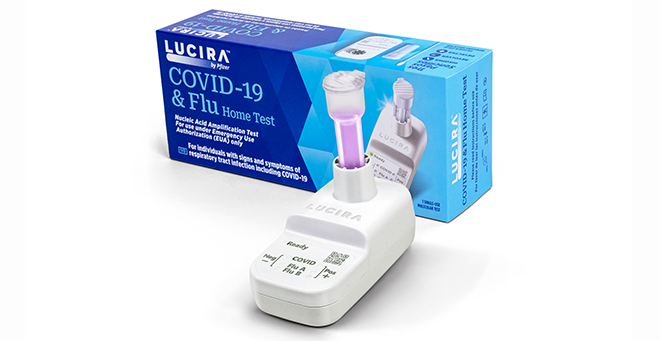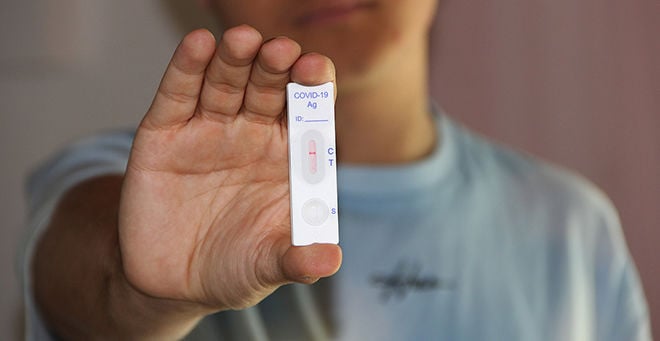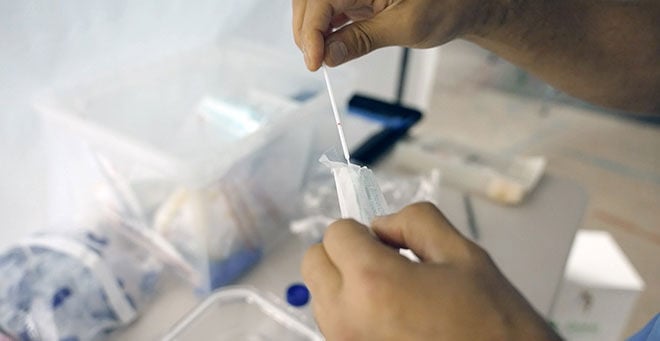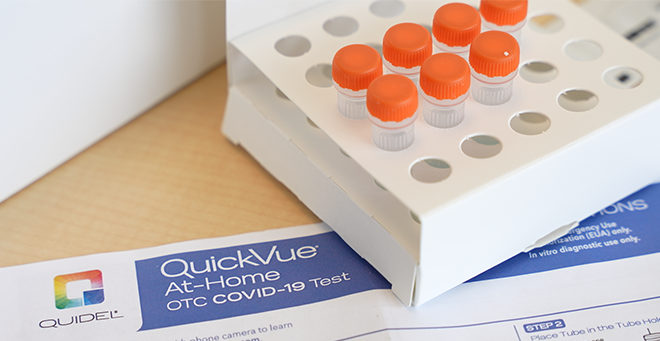UMass Chan Medical School researchers are taking lessons learned from a pilot study on at-home COVID-19 testing and telehealth and broadening their evaluation to a larger federal Home Test to Treat program. The expanded program is now available nationwide and offers eligible individuals free at-home testing, telehealth and treatment for both COVID-19 and for influenza (flu) A and B.

Home Test to Treat is a collaboration of the National Institutes of Health, the Administration for Strategic Preparedness and Response and the Centers for Disease Control and Prevention. UMass Chan serves as the research partner and digital health technology firm eMed as the telehealth partner.
A pilot study in Berks County, Pennsylvania, focusing on engaging community partners such as local health departments to reach underserved populations who could benefit from this program, has informed the expansion to the nationwide COVID-19 program begun in summer 2023. The new, expanded program now also includes at-home testing and treatment for flu.
“Every winter, people tend to get respiratory infections. What we’re trying to understand is, can we have a program like this that can give you home-based care without you needing to go into the physician’s office?” said principal investigator Apurv Soni, MD, PhD’21, assistant professor of medicine and co-director of the Program in Digital Medicine at UMass Chan.
A major goal is to increase testing and treatment equity in vulnerable populations and among those who have limited access to health care.
Dr. Soni said the expanded program includes the LUCIRA by Pfizer COVID-19 & Flu (A/B) Test. This test, which is a molecular test that checks for viral RNA and is different from the at-home rapid antigen tests most people are familiar with, is the first and only such technology that can detect both viruses in a single test at home.
The expanded Home Test to Treat program offers free at-home COVID/flu tests for those who are uninsured or underinsured, or are enrolled in Medicare, Medicaid, VA Health Care or Indian Health Services. Participants who test positive can receive free telehealth care and treatment such as Paxlovid or Tamiflu, if prescribed.
People who are privately insured or insured through their employer are eligible to enroll in Home Test to Treat with a positive COVID-19 and/or flu test. They can receive free telehealth care and treatment, but they are not currently eligible to receive free tests.
UMass Chan researchers analyzed the data from the pilot program and collaborated with eMed to make changes to improve the program, Soni explained.
One change was to recruit community engagement specialists to reach people from marginalized communities. This became even more important after word of nationwide eligibility for the program spread on X (formerly Twitter) a few months ago.
“One influential person tweeted about it as a way to get free tests and over a matter of 24 to 36 hours, more than 15,000 people enrolled. So, the program went viral,” said Soni.
“That posed a challenge for us because we don’t want this program to just be providing free tests. We also want to make sure we are providing it to the people who need it the most,” he said, not just those who are active on social media and have other resources.
In addition to adding community engagement teams after the pilot study, enrollment criteria were refined to save the free tests for those without insurance or on federal insurance programs.
Investigators in the expanded study are also analyzing how prescription patterns for such drugs as Paxlovid, a COVID antiviral drug, and Tamiflu, a flu medication Soni called effective yet under-prescribed, are affected when people receive them through home telehealth prescription and if needed, delivery.
Home Test to Treat is expected to enroll 60,000 to 70,000 participants, according to Soni. The program is a component of the Rapid Acceleration of Diagnostics (RADx) Tech program of the National Institute of Biomedical Imaging and Bioengineering at the National Institutes of Health.


